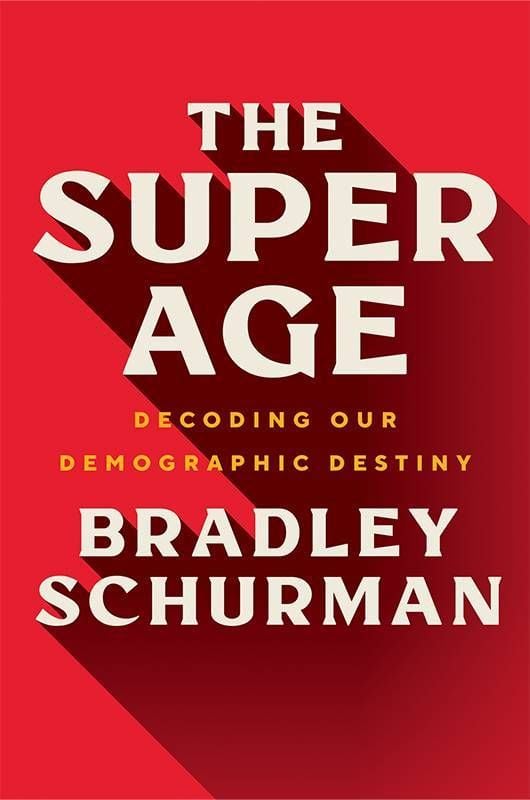What 'The Super Age' Megatrend Means for You and Your Money
Highlights from the ‘Friends Talk Money’ podcast chat with demographer and author Bradley Schurman
Demographic futurist and longevity expert Bradley Schurman says there's a seismic event — a "super megatrend" — upending and reshaping most of our social, political, cultural and economic norms. It's population aging and it'll have major effects on your personal finances, your career and your life as you get older.

I spoke with Schurman, author of the intriguing new book "The Super Age: Decoding Our Demographic Destiny," about all this for the new "Friends Talk Money" podcast episode I co-host with Pam Krueger and Terry Savage.
In the episode, which you can hear wherever you listen to podcasts or at the end of this article, Schurman, Krueger, Savage and I shared our thoughts about "The Super Age" specifically for people 50+ — a group Schurman's especially familiar with as the former head of global partnerships at AARP.
What is The Super Age?
Before I tell you the key takeaways from Schurman and the podcast hosts in the "Friends Talk Money" episode, a little about what "The Super Age" means.
"Super Age is really a U.N. designation for populations and how they're aging. It is a line where populations move, to have one out of five people over the age of sixty-five," Schurman said on the podcast.

Today, 54 million Americans are over 65 and all boomers will be over 65 by 2030, just eight years away.
For most of history, Schurman noted, The Super Age has been "a rather pejorative term — it's signaled when societies could expect to essentially start to see their economies contract and incredible challenges to pension systems and health care systems because of an incredibly large older population and an imbalance in the labor force participation rates."
In his book, Schurman said, he wanted to take this relatively negative term and the idea "that we somehow stop when we turn sixty-five 'like magically, Boom, we're done!'" and make The Super Age positive.
That's because he thinks "we're entering a golden period of mankind."
Are We Ready for The Super Age?
But is society — and are we — ready?
That's a big theme of "The Super Age" as well as the fine new book, "The AgeTech Revolution" by Israeli gerontechnologist and Next Avenue Influencer in Aging Keren Etkin and the equally fine new "Century Lives" podcast from the Stanford Center on Longevity.
As Etkin says in her book: "The next five to ten years are critical for us as a society, and we need to make sure we are positioned to deal with the demographic shift ahead."
Schurman's optimistic. "The future may be gray, but it's incredibly bright," he wrote in "The Super Age."
How Employers Must Adapt
In the "Friends Talk Money" podcast, Schurman (who's 44) said a potentially catastrophic effect of The Super Age, however, would be if employers don't change their workforce policies to better serve older workers.
"If we do nothing, if we continue to push people out of work because they're older… the social fabric of society starts to fray," he noted. "If we don't have people working, we don't have people earning, we don't have people being active consumers. And if larger numbers of them keep falling out of the workforce… those structural changes will show up not only in our ability to retain and recruit talent, but also [in our ability] to create an active consumer base, which is what we want in a healthy and functioning economy."

Said Krueger: "Employers have to start to get on that bandwagon sooner than later," adding that "companies would be smart to lead the way to encourage older workers who want to stay and even entice those employees to continue."
Workforce shortages brought on by the pandemic and "The Great Resignation" seem to be leading some employers to hang on to, and hire, older workers. But that, Savage feared, could be just an economic blip.
When Krueger said she thought it's in everyone's best interest for employers to embrace older workers, Savage responded: "Dash of cold water here, Pam. I don't think that's what's happening yet. And I don't see it on the nearby horizon."
And, she added, "I don't think we can count on corporate America to suddenly say, 'Wait a minute. We have some older people who are really smart. We ought to hang onto them.' I just don't see it happening."
Time to End the Seniority System?
Schurman offered a fairly controversial view on what might persuade more employers to keep and look for older workers: trashing the seniority system that pays employees more as they age and work more years at their jobs.
"I think the idea of seniority and work made sense at one point in time. It doesn't necessarily make sense anymore," he said. "I think one of the most revolutionary things businesses can do is to speak to their employees about what they really want."
For some older workers, the answer might not be money as much as flexible hours and remote jobs.
The Super Age and Entrepreneurship
For others, it might be leaving their jobs to start businesses.
Said Schurman: "The most successful entrepreneurs start around age forty-five," adding "that is something that will continue to grow going forward."
His caution for those thinking about launching businesses later in life: "You have to make sure you have the finances to do it. I don't think there's been adequate explanation of what the risk assessment should be."
Implications for Social Security and Medicare
The Super Age trend, however, also means that we need to expect significant changes to Social Security and Medicare, Schurman said. The government's retirement and health care programs are already straining financially and are expected to face serious solvency issues; the Medicare Part A Trust Fund is due to be insolvent in 2026 and the Social Security Trust Fund in the 2030s.
"I think the idea of seniority and work made sense at one point in time. It doesn't necessarily make sense anymore."
"The world in which Medicare and Social Security was built is not the world in which we exist today," Schurman said. "The demographics have simply shifted."
To ensure that future generations have access to health care and retirement benefits when they reach their 60s and beyond, "we've got to make adjustments now" to Medicare and Social Security, Schurman said.
He believes that means pushing back the Full Retirement Age to collect Social Security benefits from today's age 67. If that happens, there'd be more pressure for older adults to work longer.
Savage and Krueger said the stress on Social Security could also mean changing the program's payroll-tax rules to apply to income for people earning over $147,000 and potentially trimming Social Security benefits.
Financial Planning Advice for The Super Age
Savage offered one piece of Super Age financial planning advice from a recent interview she had with economics professor Laurence Kotlikoff about his new book, "Money Magic."
She noted: "The proper time horizon for financial planning is — as crazy as it sounds — says Kotlikoff, your maximum possible lifespan; the oldest age at which you could live."
The current life expectancy in the U.S. at birth is about 77. "Plan for being above average in longevity," Savage said.


